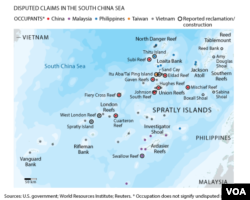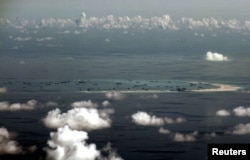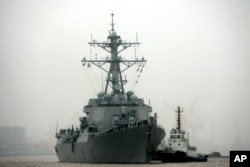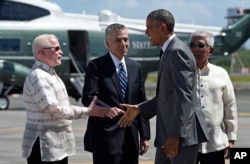The latest high-profile meeting of Southeast Asia's primary political and economic organization began Wednesday in Kuala Lumpur amid what Malaysian officials describe as a doubling of security in the wake of the fatal attacks in Paris.
After the bombings and shootings by followers of the Islamic State group last Friday in the French capital, the Association of Southeast Asian Nations (ASEAN) summit is expected to put more emphasis on regional security and countering terrorism.
The attacks in Paris also partly overshadowed the G-20 meeting in the Netherlands and the Asia-Pacific Economic Cooperation (APEC) summit in the Philippines in the past week.
Group criticized
ASEAN summits, however, are not known for their headline-grabbing announcements. Critics deride the organization as a mere discussion group rather than an effective forum for regional diplomacy and conflict resolution.
China, one of the ASEAN outsiders invited to participate, has no problem with that characterization.
On Tuesday, Chinese Vice Foreign Minister Liu Zhenmin said the territorial dispute should also not be a focus of the East Asia Summit, held after the ASEAN meeting.
Liu maintained that China is a victim in the South China Sea dispute, because it has islands and territories occupied by other countries and Beijing has shown “great restraint” in not seizing territory.
The United States, Vietnam, the Philippines and other nations have expressed alarm at China’s rapid island-building in parts of the disputed territory, arguing that Beijing is trying to assert its disputed claims without discussion in international forums such as ASEAN gatherings.
U.S. President Barack Obama, in his meetings at ASEAN, “will continue to urge all claimants in the South China Sea to halt further land reclamation, construction of new facilities, and militarization of features they occupy, in order to reduce tensions and create diplomatic space for lasting, lawful and peaceful solutions to emerge,” according to a White House statement.
Joint statement blocked
China, earlier this month, successfully blocked a joint statement of ASEAN defense ministers amid disagreement over how to refer to the maritime dispute.
At the time a U.S. official said the lack of a statement “reflects the divide China’s reclamation and militarization in the South China Sea has caused in the region.”
It was an echo of the 2012 ASEAN Summit in Cambodia when no joint statement was issued due to the same disagreement.
That may happen again in Kuala Lumpur, where the leaders' meeting continues through Sunday.
Sea dispute rift deepens
China “would generally attempt to block it at every similar kind of meeting whether its of defense officials, foreign ministers or heads of state. So I would expect the same kind of dynamic to be taking place, mostly behind closed doors, at this upcoming meeting,” Denny Roy, senior fellow at the East West Center in Hawaii told VOA.
“Ideally, China would like to discuss the issue only with each individual claimant on a one-on-one basis," Roy said.
China reiterated its assertion that Washington is “taking sides in the South China Sea issue” after a pair of U.S. Air Force bombers flew near artificial Chinese-built islands in the disputed waters.
The U.S. should “be cautious about its words and deeds and “not hype up the South China Sea issue," the foreign ministry spokesman said.
The bombers flights came after the U.S. Navy's guide missile destroyer, the USS Lassen, conducted maneuvers in the area of the Spratly archipelago, which Beijing condemned as illegal and “extremely irresponsible.”
ASEAN members Brunei, Malaysia, the Philippines and Vietnam have claims to parts of the South China Sea, of which China also considers its maritime territory.
Anticipation for 2015 AEC
For the business community there are limited expectations for the ASEAN meeting despite the presence of many powerful leaders from the region and outside of it.
The 27th ASEAN Summit includes the organization's dialogue partners, most prominently China, India, Japan and the United States.
“The November summit includes the East Asia Summit, which primarily focuses on political and security issues. So that's going to be a big part of what is actually going on around the summit,” said Anthony Nelson, a director at the US-ASEAN Business Council. “A lot of the work that business gets really involved in tends to happen around the ASEAN economic ministers' meeting in August.”
This week's leaders' summit is the last one prior to the launch of the ASEAN Economic Community (AEC) on December 31.
The AEC, which will be equivalent to the world's seventh-largest economy, is intended to create a highly competitive single market and production base.
Little, however, is to change the day AEC is born at year's end as much remains to be done to liberalize investments and capital flows.
“The ASEAN single window, which is a customs project, is still very much a work in progress. But beginning next year they will start limited trials with five of the ten ASEAN countries,” Nelson, of the US-ASEAN Business Council, told VOA. “And there have been past mutual recognition agreements for credentials of skilled professionals. But there's still a lot of work to be done in terms of actually implementing those agreements.”
Some in the region, however, predict implementation of the AEC will excessively benefit corporate interests, not the majority of the region's population.
“As ASEAN moves towards regional economic integration, unequal and unsustainable economic growth will result in worsening poverty, inequalities of wealth, resources, power and opportunities between countries, between the rich and the poor and between men and women,” warned the ASEAN Civil Society Conference and ASEAN Peoples' Forum in a joint statement early this year.
“Cross-border migrant workers don't have the same level of protection or interest in the whole negotiation,” Jerald Joseph, the co-chair of the ASEAN Peoples' Forum 2015 told VOA. “So that's a little bit of a pity, a wasted chance, if it's not reflected in the coming document.”









